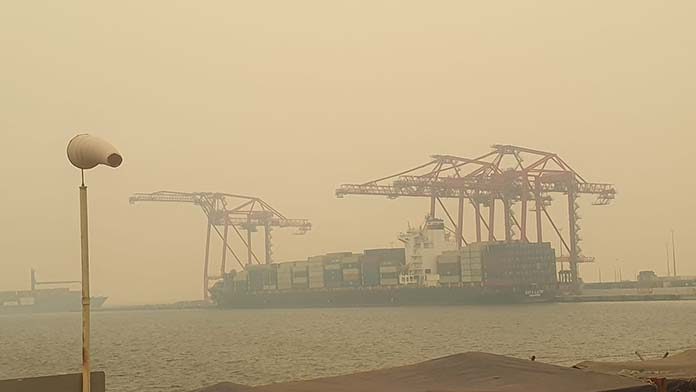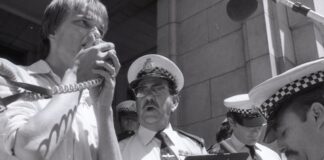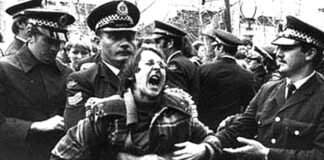Air pollution and smoke from the bushfires has blanketed the country for days on end. Many workers on construction sites and ports, and even in government offices in Canberra, have stopped work due to air quality problems.
At Port Botany in Sydney the Maritime Union of Australia (MUA) has drawn up official advice that members should stop strenuous outside work as soon as the air quality rating reaches “very poor” or “hazardous” on the NSW government’s air quality index. In early December following an initial stop work at DP World, all three terminals in Sydney stopped work due to poor air quality.
Solidarity’s Erima Dall talked to Justin Timmins, the safety committee rep at DP World at Port Botany in Sydney, about their fight to avoid unsafe working conditions.
What happened when the smoke became a serious issue in December? How did workers at DP World make the decision to stop work?
Due to the unprecedented air quality we were all suspicious that the [stevedoring companies at Port Botany], DP, Patrick and Hutchison, had no proactive control measures. It happened by chance that our port safety committee’s first meeting was in early December. So we spent the whole day formulating a process around air quality.
In our work wharfies are exposed to bad air quality as it is. We’ve had a couple of guys at DP World who’ve come up with viral infections that doctors are saying have been exacerbated by exposure to smoke. If you’re exposed to vigorous heavy work day after day in bad air quality who knows the longstanding health issues that may arise from it?
Sometimes people’s health has got to come before the dollar, like a shift delay when there’s a massive swell or particularly strong winds. This needs to be dealt with in the same way.
Why did DP World dock workers’ pay for workers on one shift?
The management tried to claim it was some type of industrial action [when wharfies stopped work].
They docked the [Christmas] bonus but did end up paying it back after a bit of pressure. But they’ve still withheld pay for a couple of hours on the afternoon shift, because they tried to claim the correct consultation hadn’t taken place, even though the company supervisor had stood workers down.
It’s just a bullying tactic to try to get friction between the workforce and the decision the delegates and the union are making. But workers appreciate that they’re working in a highly dangerous industry and there’s safety and union delegates out there that are looking out for their best interests, because they haven’t got a lot of confidence in the business providing that.
Why did the union form the Port Safety Committee and can you explain what that is?
In late 2018 there was a national safety conference held in Sydney and [setting this up] was one of the resolutions.
Even with DP nationally it’s every port for themselves, there’s no real platform of best practice nationally. That’s was why at Port Botany in Sydney we wanted to say at least that there’s [common safety standards] across the three ports.
We’re doing some good work at the three ports now in consultation with Worksafe and safety managers to minimise that exposure and we just need the managers from the three different ports to agree that their workers’ health is the number one priority.
What lessons are there in how you’ve dealt with the unsafe air quality and smoke for other workers who face similar problems?
Under the WHS [Workplace Health and Safety] Act companies have to provide a safe workplace. But without unions and without structured safety committees and HSRs [Health and Safety Reps] and delegates that are aware of their rights in the workplace you’re on very shaky ground. Businesses will try anything just to keep the productivity on the wharf going.
It’s not too long ago that the stevedoring business were stating that it was safe to work with asbestos. It was unions and all their hard work for people impacted by asbestos that they’ve been entitled to compensation.
Is there a recognition amongst workers that climate change is responsible for the fires and the smoke conditions?
I personally think the government’s inaction and arrogant disregard of advice has contributed to what we’ve experienced recently. We can’t just keep spewing CO2 into the air and killing reefs and having water levels rise and catastrophic different conditions around the world.
I think everyone’s of the same opinion that we can’t just bury our head in the sand about it, something’s happening to our world and if we want our kids to be able to enjoy life the way we have it’s up to us. I’m proud of the student movement and how they’re doing leading the way on it.






